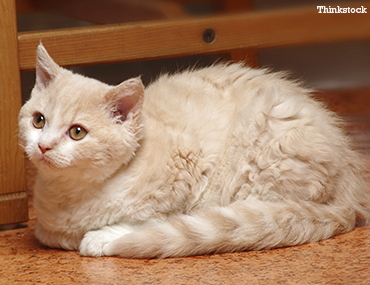Background:
The Selkirk Rex originated in 1987 when a rescued cat gave birth to a litter of kittens in Montana. One of the kittens had an unusually curly coat: she was named Miss DePesto. Miss DePesto was then bred with a black male Persian, producing three curly Selkirk Rex kittens and three kittens with straight hair of a different breed.
Selkirk kittens are born with curly coats, but when they reach about 6 months of age they lose their curls and grow a thin straight coat. Don’t worry though, once they reach maturity, their hair flourishes into a soft, thick coat that is comparable to lambs wool.
Cat Facts:
- The Selkirk Rex is one of the youngest cat breeds.
- Their coats can be either long or short and come in all colors including pointed and sepia.
- The Selkirk Rex weighs between six and sixteen pounds and lives up to thirteen years or more.
- In addition to the curly coat on this cat, their whiskers are curly as well!
What's the Selkirk Rex like?
The Selkirk Rex is a medium to large sized cat that is very sturdy. The Selkirk loves to cuddle. Although they’re not particularly active they’re outgoing, which is good considering everyone will want to pet and feel the curly-q’s on this cat.
Since The Selkirk Rex is genetically linked to Persians, Exotics and British Shorthairs they can acquire health issues such as polycystic kidney disease, hypertrophic cardiomyopathy and hip dysplasia.
Takeaway Points:
- You should have a sense of humor to own this cat. Get ready to hear jokes such as “looks like your cat is having a bad hair day!” or “Do you ever groom your cat?”
- Because of the especially thick coat you will want to brush your furry friend about two to three times per week to prevent mats or tangles.
- If you live alone or have a lot of alone time, the Selkirk loves to have conversations with you while sitting on your lap.
- If you have allergies, this cat can make them worse because they produce dander (although no cat breed is better or worse for people with allergies).
If you have any questions or concerns, you should always visit or call your veterinarian – they are your best resource to ensure the health and well-being of your pets.
